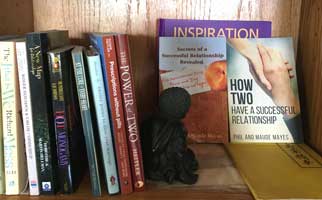Successful Relationship Reading Corner
 This week, we wrote that neediness is not good for you and your relationship. Here are some articles with suggestions on how to handle this issue. This week, we wrote that neediness is not good for you and your relationship. Here are some articles with suggestions on how to handle this issue.
5 Ways to Become Less Emotionally Needy In Relationships "Most of us feel ’emotionally needy’ at times in relationships – meaning that during a difficult or challenging time in our life, we need more emotional support than usual. I get it. Its pretty common. We all long to be understood, supported, loved, and accepted. And it’s ok to feel this way – periodically. Yet, being overly emotionally needy – too demanding, clingy, annoying, fragile – can spell disaster for your relationship. Being a healthy person means standing on your own, being able to tolerate aloneness, and manage their own ‘sh*t. That’s how healthy relationships thrive and grow."
The Problem With Neediness (Or: The Anti-Sex Equation) "There’s a recurring thread I’ve seen lately online, whether it’s in the comments here or in a few of the other forae where I lurk: an increasing sense of desperation for a relationship. As we’re running headlong into the holiday season, it’s only natural for the singletons amongst us to look around at all of the happy couples with a certain level of bitterness and envy. When you’re single and alone in a season that celebrates relationships and togetherness1 it’s hard not to feel an empty hole in your life that can only be filled with the sort of love that’s only found in coffee commercials."
How to overcome neediness, grasping and withdrawal in relationships "We’re wired for attachment – that’s why babies cry when separated from their mothers. Depending especially on our mother’s behaviour, as well as later experiences, we develop a style of attaching that affects our behaviour in close relationships. We seek or avoid intimacy along a continuum, but generally we fall into one of the following three attachment styles whether we’re dating or in a long term relationship. (We all have an element of each of these styles too.) The question is, what is your predominant attachment style? That’s where majority of your work, your GOLD will be."
|
|